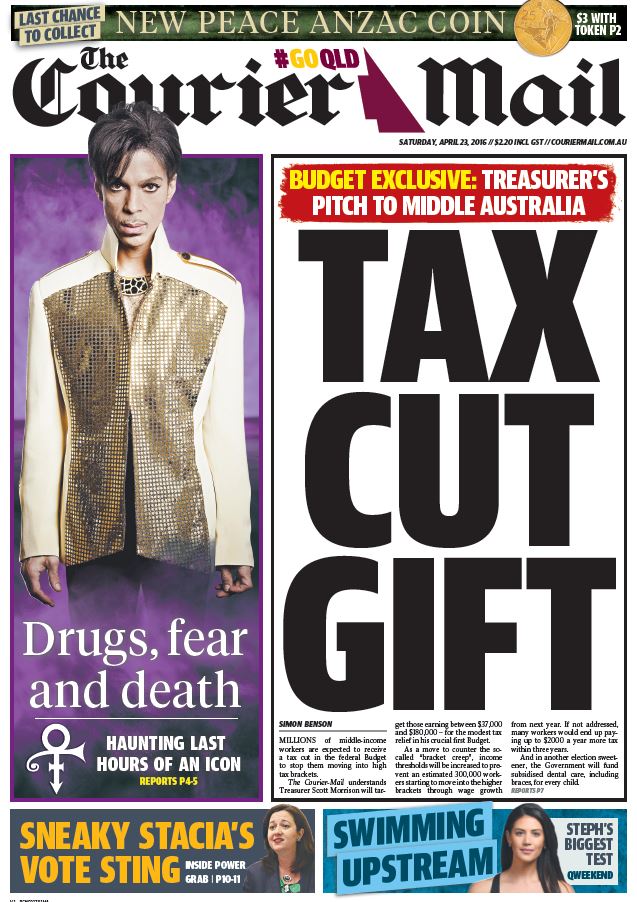- I would blow Dane Cook
- Dec 26, 2008
-
|
quote:
Tony Abbott: I’m not blind to the flaws that ended my leadership
No change of leadership happens overnight, as political parties don’t lightly cull their leaders, especially in government. Inevitably, it involves much disruption and lasting bad blood. It’s hard to vote no confidence in the prime minister without casting aspersions on the government too. It only happens when a majority of MPs have concluded that they’d be more likely to gain promotion, win their seats or hold government under someone else. The question for me is not just what others might have done wrong but what I could have done better or differently to have made the coup less likely.
Inevitably, some criticism is justified. No one makes the right call on everything. There are some “no win” decisions, no matter who or how gifted the decision-maker might be. I am convinced that the Abbott government got the big things right. Equally, there’s no doubt that there were mistakes in smaller things that loomed large enough for my colleagues to think that they would fare better under a new leader.
No one could credibly claim that I ran a “do nothing” government. My 2013 election campaign pledge was that we’d stop the boats, scrap the carbon tax, build the roads of the 21st century and get the budget back under control. Just two years on, with the partial exception of budget savings, the Abbott government had substantially delivered. In addition, we’d finalised three historic free-trade agreements with our largest trading partners; ended the practice of bailing out failing businesses; ramped up national security against unprecedented terror threats at home and abroad; and there was an orderly process in place to handle complex and contentious issues such as tax reform and federation reform via two white papers. Despite headwinds abroad, about 300,000 extra jobs had been created in an economy that was “under new management and open for business”.
If the Abbott government really had been chaotic and dysfunctional, as alleged, how did all this happen? Stopping the boats was supposed to be impossible. Labor said it was an undeliverable three-word slogan. The boats were stopped because the government had a crystal-clear objective, a well-thought-through plan and the capacity to adapt to changing circumstances; and, most importantly, the ability of ministers to work together with senior officials and with thousands of personnel to get things done.
If the Abbott government really had zero ability to work with the Senate, how did we manage the repeal of the carbon tax and the mining tax, plus significant pension reform and a raft of savings totalling $50 billion over the forward estimates? If I had failed to grow into the job of being prime minister, who or what persuaded the leaders of South Korea, Japan and China that FTAs that had eluded my predecessors for a decade were a good idea; and how had the G20 that I chaired been such a diplomatic success? If the Abbott government had been uninterested in economics or incapable of serious reform, how could we have resisted the pressure from big businesses to bail them out of trouble? If I really had been incapable of putting nation before party, how did the government maintain bipartisanship on four tranches of national security legislation?
If the Abbott office really had been oppressive, why was staff turnover so low? How could a badly managed operation have managed to dispatch a Labor government in almost record time? No large office working under great pressure is free from tension or personality clashes but my team was highly professional and included some who’d worked in senior roles in the Howard office and ministry with which, they thought, mine stood comparison. The last thing former members of my staff deserve is to have their reputations blackened by people trying to justify a change of leadership.
The most compelling vindication of the Abbott government has been the Turnbull government’s maintenance of its key policies: including turning around illegal immigrant boats, direct action on climate change, a plebiscite on same-sex marriage and stripping terrorists with dual nationality of their Australian citizenship.
All prime ministers have to make hard calls, as so many decisions are contentious, even within parties, and have to be resolved by someone taking a side. The challenge is to ensure that people feel sufficiently “in the loop” to accept the decisions that go against them. There were some issues that the Abbott government could have managed better or not pursued at all. Still, some of our thorniest problems were handled with a collegiality quite at odds with the repeated allegations of “command and control”.
After winning the leadership by just one vote in 2009, at Kevin Andrews’s urging I held an unprecedented secret ballot where the partyroom overwhelmingly confirmed that we would oppose the then Labor government’s emissions trading scheme. Once the policy question had been resolved, there was no ideological “get square” because our party, in John Howard’s words, flourishes as a “broad church”. Successful political parties need to make the most of all their talent; so once he’d decided to stay in the parliament, I restored Malcolm Turnbull to the shadow cabinet in the post-2010 election reshuffle.
Our direct-action policy on climate change — tree planting on poor soils, improved pasture and new technology — was designed not only to reduce emissions but to improve our economic performance as well. By adopting such measures in preference to an emissions trading scheme, the party stayed united because these measures made sense regardless of the precise extent of man-made global warming.
Same-sex marriage became a fraught issue as soon as Labor changed its position to allow a conscience vote. Prior to the 2013 election, my response to colleagues who were keen for change was that there couldn’t be a free vote on a matter of party policy. More importantly, we couldn’t credibly drat Labor on the carbon tax (for having one policy before an election but a different one afterwards) if we did exactly the same with same-sex marriage.
Going into the 2013 election, our position was that same-sex marriage would be a matter for the Coalition partyroom if a private member’s bill were to come up in the next parliament. By the time one did, in mid-2015, the National Party remained overwhelmingly opposed while a significant minority in the Liberal Party had become strongly in favour.
As prime minister, Howard had shrewdly pointed out that the Liberal Party was the representative, in this country, of both the small-l liberal and the conservative political traditions. In my judgment, the principal political party of the centre-Right could not lightly abandon an understanding of marriage that had stood since time immemorial. We needed an outcome that accommodated changing views inside the party and within the community but that respected the traditional concept of marriage.
In our partyroom debate, almost every MP spoke and about two-thirds supported marriage between a man and a woman. In my judgment, the minority view was too strong for the pre-existing policy to stand unaltered for another term but that meant finding a mechanism to deal with it that both sides could respect with an outcome that nearly everyone could accept. Hence, a plebiscite in the next term of parliament.
Not all the contentious issues that the Abbott government faced were as successfully managed. A very serious mistake, in retrospect, was abolishing the debt ceiling. This was done to avoid a confidence-sapping “fiscal cliff” early in the life of a new government. We never imagined that the crossbench elected in 2013 would be so resistant to spending cuts. After its mistakes in government, we never imagined that the Labor Party would be so committed to unsustainable spending. What’s now apparent is that the debt ceiling would have forced both the opposition and the crossbench to face fiscal reality in a way that no amount of cajoling could.
Another serious problem was how to balance pre-election commitments with the worse-than-expected budget position we inherited and the faster-than-Treasury-forecast collapse in the terms of trade. The budget repair challenge in 2014 was even bigger than in 2013 when, in opposition, I’d declared a “budget emergency”. The Abbott government tried to balance the need to keep commitments with the need for budget repair by starting some key savings measures (such as pension changes) after the next election. I thought that this was akin to Howard promising “never, ever” to introduce a GST but then taking one to an election. Still, the public felt let down — and, in politics, it’s the perception that matters most.
At the very beginning of the Abbott government’s life, I made a series of decisions that were reasonable, even self-evident in principle, but which created much resentment in the partyroom. I stopped the employment of immediate family members in MPs’ own offices because of the inevitable perceptions of favouritism; I ended first-class overseas travel out of respect for taxpayers; and I restricted family travel within Australia and spouse travel overseas because family very rarely accompanied business trips in the private sector. These were perks many MPs had understandably enjoyed and that previous prime ministers had tolerated. In some cases, having a spouse in the office, paid or unpaid, may have helped MPs’ work. With the benefit of hindsight, at the very least, I should have handled this more sensitively.
Section 18C of the Racial Discrimination Act makes it illegal to “offend, insult, humiliate or intimidate” people on race grounds. This is clearly a bad law. Our debates should be polite but they should never be guaranteed not to offend. The Coalition had opposed section 18C on free speech grounds when it was introduced by the Keating government. Still, the Howard government had left it on the statute books presumably because it was rarely used. It was only after the columnist Andrew Bolt was successfully prosecuted in 2011 that the Coalition promised to “repeal it in its present form”.
A rather convoluted draft repeal bill prompted backbench threats to cross the floor and fierce criticism from state Liberal leaders. As well, by mid-2014, with the terror threat rising, I was starting to consider new laws to crack down on Islamist hate preachers. Nevertheless, as soon as I said that changes to section 18C were “off the table”, there were cries of betrayal from conservatives who had hitherto been largely silent. With hindsight, I should have persisted with a simpler amendment along the lines of senator Bob Day’s later private member’s bill.
Another big problem was the six-months-at-full-pay government-funded paid parental leave scheme that I’d first advocated in my book Battlelines and had taken to two elections as Coalition policy. If couples where both partners work for middle incomes are to have more children, it really must be easier to combine work and family. Modern conservatism should make it more practical for more people to have more children. Still, some colleagues felt deeply that it was valuing women in the workforce ahead of stay-at-home mums. Well before a group of conservative dissidents had emerged, I should have concluded that budget realities made this policy undeliverable.
The restoration of knighthoods in the Order of Australia was a personal decision. Sir Peter Cosgrove, Dame Quentin Bryce, Dame Marie Bashir and Sir Angus Houston were popular choices, but knighting Prince Philip generated a storm of criticism. No one raised it with me when I spent an hour in a public bar in Colac a few days after Australia Day 2015 but it was certainly cited by colleagues at the time of the attempted spill a fortnight later. I should have anticipated this hostility (even though Canada and New Zealand had not long before each conferred on Prince Philip their highest honour) and I should have left these awards in the hands of the council of the order. Likewise, the initial presence of only one woman in the cabinet was an avoidable error.
Looking back over my prime ministership, I should have done more media interviews, especially long-form interviews where voters see more personality and less adversarial sparring. Yes, there’s always the risk of mistakes but there’s also the chance to develop an argument and to engender confidence.
In retrospect, the small things that annoyed people tended to outweigh the big things that pleased them. There were always people willing the Abbott government to fail but I made some unnecessary enemies and left too many friends feeling under-appreciated. The Australian newspaper, for instance, welcomed the China free-trade deal but on its front page criticised the government for its inability to market its own success.
In this climate, everything became questionable, even volunteering in remote indigenous communities or the annual Pollie Pedal charity bike ride that would normally have been marks of authenticity, or at least originality. It became beneath the dignity of a prime minister to serve in the local rural fire brigade or to do surf patrol, at least if it meant wearing Speedos!
I can’t let pride in what was achieved under my leadership blind me to the flaws that made its termination easier, even if claims were exaggerated or exploited in self-serving ways. Enough went wrong to cause the Liberal Party to copy Labor’s decapitation of a first-term government, rather than to learn from it; and, for that, I must take responsibility.
I received a lot of public advice to drop key personnel, including treasurer Joe Hockey and chief of staff Peta Credlin. As is now more apparent, it’s far from easy to deliver savings against a hostile Senate, with big spending “Abbott-proofed” in legislation. It’s far from easy to deliver tax reform in an era of chronic deficits. In prime ministers’ offices, there has to be a balance between “going with the flow” and “getting the message right”; even standing up to ministers when the situation demands it. My considered judgment was that dumping people who were working in lock-step with the prime minister was much more likely to trigger a crisis than to resolve one.
Looking back, the Abbott government’s biggest problem was people’s reluctance to accept that short-term pain might be needed for long-term gain. People readily believe that what’s said to be in the national interest is really just someone else’s self-interest. Resentment that someone, somewhere, somehow is getting a better deal is easy to exploit, especially in the era of social media and a Senate that no longer sees itself as a house of review. Governments have a big megaphone but it’s harder and harder to have a measured debate about anything that involves reducing benefits or services, however unsustainable they might be. Even if the fundamental point is conceded, there is always someone or something else that should be targeted.
The Abbott government was committed to budget surpluses — and to securing the savings to obtain them — so that we could responsibly deliver lower taxes and greater prosperity. We supported a Medicare co-payment because people should make a contribution to the services they receive, rather than expect something for nothing. We wanted school-leavers to go to work or to stay in education or training because no one should begin adult life on social security if there is an alternative. We wanted to reform pensions because you can’t have fewer workers supporting more pensioners without feeding intergenerational resentment. We sought a lower rate of increase in commonwealth funding for public schools and public hospitals because the states should take more responsibility for the services they deliver. There was a moral purpose to all the reforms of the 2014 budget but it was lost in a welter of complaints about cruel cuts and broken promises that made the government look more interested in economic theory than in people’s lives.
People needed a greater appreciation of the government’s aims. We needed to explain better that sensible economic policy is not an end in itself but the means to a better society and to people being more able to achieve their potential. In the busy-ness of public life and in the crossfire of politics, the Abbott government was too often unable to convey that its fundamental purpose was a stronger society and more fulfilled people.
The conservative side of politics is not just about better economic management. We’re about the greater fairness, more thoroughgoing justice and deeper empowerment that a stronger economy makes possible. This was the challenge that the Abbott government couldn’t always rise to and that I hope to address in my future public life.
This is an edited extract from the third and final article Tony Abbott agreed in January to provide to Quadrant magazine in defence of the Abbott government’s record. The full article will appear in the May edition of Quadrant. “The Economic Case for the Abbott Government” was published in the March issue and “The National Security Case for the Abbott Government” in April.
http://www.theaustralian.com.au/opi...4e74fff79104eb7
|


































